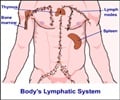A new study has found evidence that our ancestors fought against an ancient retrovirus with a defence mechanism that our bodies still use today.
Our ancestors fought against an ancient retrovirus with a defence mechanism that our bodies still use today, a new study has revealed.
Researchers at Rockefeller University and the Aaron Diamond AIDS Research Centre had earlier brought an ancient retrovirus back to life and showed it could reproduce and infect human cells."This is the first time that we've been able to take an ancient retrovirus and analyze how it interacts with host defense mechanisms in the laboratory in the present day," said Paul Bieniasz, who is an associate professor and head of the Laboratory of Retrovirology at Rockefeller and a scientist at the Aaron Diamond AIDS Research Centre.
The team looked at their resurrected virus, called HERV-K and tested its strength against molecules involved in human antiviral defense.
They found that human cells infected with HERV-K fought back with several antiviral proteins.
One of those proteins, called APOBEC3G, mutates virus DNA in a recognizable pattern and is one our cells use to attack modern retroviruses.
"But this is the first time it's been shown for this ancient retrovirus," said Bieniasz.
Advertisement
What emerged were two copies of HERV-K that had clearly been mutated, and thus inactivated, by the APOBEC3G protein.
Advertisement
"But these sorts of ancient interactions may have influenced how humans are able to combat these retroviruses today. These proteins help protect us against current retroviruses," Lee added.
Source-ANI
RAS/L









